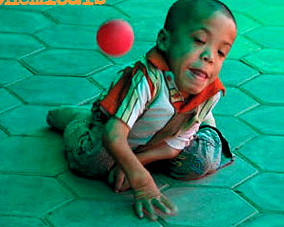Tens of thousands of children born after the Bhopal disaster suffer from growth problems
 The Sambhavna Trust is a charitable trust run by a group of eminent doctors, scientists, writers and social workers who have been involved with various aspects of the Union Carbide disaster ever since its occurrence in December 1984.
The Sambhavna Trust is a charitable trust run by a group of eminent doctors, scientists, writers and social workers who have been involved with various aspects of the Union Carbide disaster ever since its occurrence in December 1984.
The Bhopal Medical Appeal supports the Sambhavna Trust which runs the Sambhavna Clinic. Sambhavna is a Sanskrit / Hindi word which means 'possibility'. Read as 'sama' and 'bhavna' it means: 'similar feelings' or 'compassion'.
Many are unaware that the disaster in Bhopal continues to this day. An estimated 120,000–150,000 survivors of the disaster are still chronically ill. Over 25,000 have died of exposure-related illnesses and more are dying still.
Tens of thousands of children born after the disaster suffer from growth problems and many women suffer from menstrual and gynecological disorders. TB is several times more prevalent in the gas-affected population and many forms of cancers are on the rise.
In the prevailing situation of despair, the Sambhavna Trust believes in creating possibilities by generating compassion. The work carried out by the Sambhavna Trust has shown that it is possible to evolve simple, safe, effective, ethical and participatory ways of treatment monitoring and research for the survivors of Bhopal.
Provision of appropriate medical care is one of the central activities of Sambhavna. The guiding principles regarding medical care include the following:
- The medical care of the survivors should be based on the principle of 'First do no harm': therapy administered to patients must not compound the injuries sustained as a result of exposure.
- Therapies that do not contribute to the toxic load of the body are integrated into provision of medical care as far as possible.
- Integrated systems of therapy must be based on the specific symptom complexes presented by the survivors as opposed to attention to individual symptoms.
- A proper system of registration and constant monitoring of the effect of therapeutic intervention and research into the health status and efficacy of treatment must be integral to the provision of medical care.
More information here.


